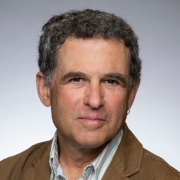Moving Forward with Radical Hope
Moving Forward with Radical Hope
8-9 May 2025

Judith Clair
Professor and William S. McKiernan '78 Family Faculty Fellow, Boston College
Judith Clair’s research focuses on demographic/social identities (e.g., race, gender, social class) and inequalities in the workplace; on development and transitions in professional identities; and on positive organizational experiences such as hope and positive growth. Her gender- and diversity-focused research includes experiences of “cross-domain” identity change in first-time pregnant professional women; how social class background shapes how women understand their advancement into top organizational positions; how benevolent sexism during pregnancy effects workplace retention of women post-pregnancy; how professional women in STEM fields define and experience benefits from others’ inclusive leadership practices; and how individuals with invisible stigmatized identities manage those identities in the workplace.
Judith Clair’s research focuses on demographic/social identities (e.g., race, gender, social class) and inequalities in the workplace; on development and transitions in professional identities; and on positive organizational experiences such as hope and positive growth. Her gender- and diversity-focused research includes experiences of “cross-domain” identity change in first-time pregnant professional women; how social class background shapes how women understand their advancement into top organizational positions; how benevolent sexism during pregnancy effects workplace retention of women post-pregnancy; how professional women in STEM fields define and experience benefits from others’ inclusive leadership practices; and how individuals with invisible stigmatized identities manage those identities in the workplace.

Caroline Elkins
Thomas Henry Carroll/Ford Foundation Professor of Business Administration, Harvard Business School
Caroline Elkins is the Thomas Henry Carroll/Ford Foundation Professor of Business Administration in the Business, Government and International Economy unit at HBS. She is also Professor of History and of African and African American Studies at Harvard University, an Affiliated Professor at Harvard Law School, and the founding director of Harvard’s Center for African Studies. She received her A.B., summa cum laude, from Princeton University and her M.A. and Ph.D. from Harvard University.
Elkins’ research focuses on empire, violence, liberalism, and insecurity, with a particular focus on Africa and various regions of the former British Empire including Southeast Asia, the Middle East, and Europe. Her first book, Imperial Reckoning: The Untold Story of Britain’s Gulag in Kenya (Henry Holt, 2005) was awarded the Pulitzer Prize for General Nonfiction in 2006. It was also one of The Economist’s Best Books for 2005, an Editor’s Choice for The New York Times, a Waterstone’s Best Writer for 2005, and a finalist for the Lionel Gelber Prize for nonfiction. She and her research were the subjects of a BBC documentary titled “Kenya: White Terror,” which won the International Red Cross Award at the Monte Carlos Film Festival. Her research also served as the basis for the historic Mau Mau reparations case, for which she was expert witness, in the High Court of London. After four years of litigation, the British government settled the case in June 2013 with an official apology and a large, cash settlement.
Caroline Elkins is the Thomas Henry Carroll/Ford Foundation Professor of Business Administration in the Business, Government and International Economy unit at HBS. She is also Professor of History and of African and African American Studies at Harvard University, an Affiliated Professor at Harvard Law School, and the founding director of Harvard’s Center for African Studies. She received her A.B., summa cum laude, from Princeton University and her M.A. and Ph.D. from Harvard University.
Elkins’ research focuses on empire, violence, liberalism, and insecurity, with a particular focus on Africa and various regions of the former British Empire including Southeast Asia, the Middle East, and Europe. Her first book, Imperial Reckoning: The Untold Story of Britain’s Gulag in Kenya (Henry Holt, 2005) was awarded the Pulitzer Prize for General Nonfiction in 2006. It was also one of The Economist’s Best Books for 2005, an Editor’s Choice for The New York Times, a Waterstone’s Best Writer for 2005, and a finalist for the Lionel Gelber Prize for nonfiction. She and her research were the subjects of a BBC documentary titled “Kenya: White Terror,” which won the International Red Cross Award at the Monte Carlos Film Festival. Her research also served as the basis for the historic Mau Mau reparations case, for which she was expert witness, in the High Court of London. After four years of litigation, the British government settled the case in June 2013 with an official apology and a large, cash settlement.

Farnaz Ghaedipour
Assistant Professor, York University
Farnaz (Naz) Ghaedipour is an assistant professor at York University’s School of Human Resource Management in Toronto. Her research examines how technological shifts—such as the rise of artificial intelligence, digital platforms, and the gig economy—intersect with cultural ideals of work, from authenticity and passion to entrepreneurialism, reshaping both the structure and experience of modern labor.
Drawing on qualitative and ethnographic methods, Naz explores work as a deeply embedded social phenomenon, complementing interviews and observations with archival and digital data. Her research spans diverse occupational groups, from Instagram content creators and journalists to Upwork freelancers, software engineers, and graphic designers.
Before joining York University, she was a postdoctoral scholar at Stanford University’s Department of Management Science and Engineering, working at the Centre for Work, Technology, and Organization. She earned her Ph.D. in Organizational Behavior and Human Resources from McMaster University in 2022.
Farnaz (Naz) Ghaedipour is an assistant professor at York University’s School of Human Resource Management in Toronto. Her research examines how technological shifts—such as the rise of artificial intelligence, digital platforms, and the gig economy—intersect with cultural ideals of work, from authenticity and passion to entrepreneurialism, reshaping both the structure and experience of modern labor.
Drawing on qualitative and ethnographic methods, Naz explores work as a deeply embedded social phenomenon, complementing interviews and observations with archival and digital data. Her research spans diverse occupational groups, from Instagram content creators and journalists to Upwork freelancers, software engineers, and graphic designers.
Before joining York University, she was a postdoctoral scholar at Stanford University’s Department of Management Science and Engineering, working at the Centre for Work, Technology, and Organization. She earned her Ph.D. in Organizational Behavior and Human Resources from McMaster University in 2022.

Carol Graham
Senior Fellow of Economic Studies, The Brookings Institution
Carol Graham is Senior Fellow in Economic Studies at Brookings, College Park Professor at the University of Maryland, and a Gallup Senior Scientist. She served on a National Academy of Sciences panel on well-being metrics in 2012-13, received Pioneer Awards from the Robert Wood Johnson Foundation in 2017 and 2021, and a Lifetime Distinguished Scholar award from the International Society of Quality-of-Life Studies (2018). She has twice served as a Vice President at Brookings, as Special Advisor to the Inter-American Development Bank, Visiting Fellow at the World Bank, and consultant to the IMF. Her most recent books (published in several languages) are: The Power of Hope: How Wellbeing Science Can Save us from Despair (Princeton, 2023); Happiness for All? Unequal Hopes and Lives in Pursuit of the American Dream (Princeton, 2017); The Pursuit of Happiness (Brookings, 2011); and Happiness around the World: The Paradox of Happy Peasants and Miserable Millionaires (Oxford, 2010). She has published articles in journals including Science, Social Science and Medicine, the Journal of Population Economics, Perspectives on Psychological Science, World Bank Research Observer; Health Affairs, Health Economics; the Journal of Development Studies; the Journal of Human Development; and the Journal of Economic Literature; and her work has been reviewed in Science, the New Yorker, and the New York Review of Books, among others, and is senior editor at Behavioral Science and Policy. She has an A.B. from Princeton, an M.A. from Johns Hopkins, a D.Phil from Oxford, and three beautiful children.
Carol Graham is Senior Fellow in Economic Studies at Brookings, College Park Professor at the University of Maryland, and a Gallup Senior Scientist. She served on a National Academy of Sciences panel on well-being metrics in 2012-13, received Pioneer Awards from the Robert Wood Johnson Foundation in 2017 and 2021, and a Lifetime Distinguished Scholar award from the International Society of Quality-of-Life Studies (2018). She has twice served as a Vice President at Brookings, as Special Advisor to the Inter-American Development Bank, Visiting Fellow at the World Bank, and consultant to the IMF. Her most recent books (published in several languages) are: The Power of Hope: How Wellbeing Science Can Save us from Despair (Princeton, 2023); Happiness for All? Unequal Hopes and Lives in Pursuit of the American Dream (Princeton, 2017); The Pursuit of Happiness (Brookings, 2011); and Happiness around the World: The Paradox of Happy Peasants and Miserable Millionaires (Oxford, 2010). She has published articles in journals including Science, Social Science and Medicine, the Journal of Population Economics, Perspectives on Psychological Science, World Bank Research Observer; Health Affairs, Health Economics; the Journal of Development Studies; the Journal of Human Development; and the Journal of Economic Literature; and her work has been reviewed in Science, the New Yorker, and the New York Review of Books, among others, and is senior editor at Behavioral Science and Policy. She has an A.B. from Princeton, an M.A. from Johns Hopkins, a D.Phil from Oxford, and three beautiful children.

John Holloway
Professor, Benemérita Universidad Autónoma de Puebla
John Holloway is a Professor at the Instituto de Ciencias Sociales y Humanidades at the Benemérita Universidad Autónoma de Puebla in Mexico, where they teach in the graduate program in Sociology. They have held this position since 1993. Prior to that, they were a lecturer in Politics at the University of Edinburgh in Scotland.
Their primary area of interest is revolutionary hope. Their research explores possibilities for moving beyond the destructive and dehumanizing structures of global capitalism. They focus on learning from and contributing to dynamic contemporary anti-capitalist movements such as the Zapatistas, the Kurdish movement, and Abahlali baseMjondolo, as well as the many lesser-known but widespread acts of resistance around the world. They are particularly interested in how academic work can be understood as part of these broader struggles for social transformation.
John Holloway is a Professor at the Instituto de Ciencias Sociales y Humanidades at the Benemérita Universidad Autónoma de Puebla in Mexico, where they teach in the graduate program in Sociology. They have held this position since 1993. Prior to that, they were a lecturer in Politics at the University of Edinburgh in Scotland.
Their primary area of interest is revolutionary hope. Their research explores possibilities for moving beyond the destructive and dehumanizing structures of global capitalism. They focus on learning from and contributing to dynamic contemporary anti-capitalist movements such as the Zapatistas, the Kurdish movement, and Abahlali baseMjondolo, as well as the many lesser-known but widespread acts of resistance around the world. They are particularly interested in how academic work can be understood as part of these broader struggles for social transformation.

Yarran Hominh
Assistant Professor of Philosophy, Bard College
Yarran Hominh is an Assistant Professor of Philosophy at Bard College. His main research area is at the intersection of moral psychology and social and political philosophy, with a particular focus on the philosophy of race. He has also published in Asian philosophy (particularly Buddhism and Confucianism) and in Asian American philosophy. His work has been published in Philosophers’ Imprint, The Journal of Moral Philosophy, The Journal of Confucian Philosophy and Culture, Comparative Philosophy, and The Pluralist, among others. His work has been translated into Mandarin and Turkish. His current book project is entitled The Problem of Unfreedom. With A. Minh Nguyen, he is the editor of APA Studies on Asian and Asian American Philosophers and Philosophies. He also serves on the editorial board of The Philosopher. He holds a BA, LLB, and LLM from the University of Sydney, where he was a Sessional Lecturer in Philosophy, and a PhD from Columbia University. He was formerly Mellon Postdoctoral Fellow in the Leslie Center for the Humanities and Lecturer in Philosophy at Dartmouth College. In other lives, he has been a journalist, martial arts teacher, musician, and lawyer.
Yarran Hominh is an Assistant Professor of Philosophy at Bard College. His main research area is at the intersection of moral psychology and social and political philosophy, with a particular focus on the philosophy of race. He has also published in Asian philosophy (particularly Buddhism and Confucianism) and in Asian American philosophy. His work has been published in Philosophers’ Imprint, The Journal of Moral Philosophy, The Journal of Confucian Philosophy and Culture, Comparative Philosophy, and The Pluralist, among others. His work has been translated into Mandarin and Turkish. His current book project is entitled The Problem of Unfreedom. With A. Minh Nguyen, he is the editor of APA Studies on Asian and Asian American Philosophers and Philosophies. He also serves on the editorial board of The Philosopher. He holds a BA, LLB, and LLM from the University of Sydney, where he was a Sessional Lecturer in Philosophy, and a PhD from Columbia University. He was formerly Mellon Postdoctoral Fellow in the Leslie Center for the Humanities and Lecturer in Philosophy at Dartmouth College. In other lives, he has been a journalist, martial arts teacher, musician, and lawyer.

Reshmaan Hussam
Ogunlesi Family Associate Professor of Business Administration, Harvard Business School
Reshmaan Hussam is an associate professor of business administration in the Business, Government and International Economy Unit, a Faculty Research Fellow at the National Bureau of Economic Research (NBER), and a faculty affiliate at the Abdul Latif Jameel Poverty Action Lab (J-PAL) and the Bureau for Research and Economic Analysis of Development (BREAD).
Her research explores questions at the intersection of development and behavioral economics, with research in three areas: migration, health, and finance. Her most recent work engages refugee populations including the Rohingya in Bangladesh, examining the psychosocial value of employment in contexts of mass unemployment, the role of home in migration decisionmaking, and refugee preferences for repatriation, integration, and resettlement. In her work in health, which involves field experiments across South Asia, she considers the puzzle of the ubiquitously low adoption of low cost, high return goods, behaviors, and technologies in the developing world, exploring the role of learning and habit formation in behavior change. Her work in finance explores how to identify high-return microentrepreneurs using local community knowledge in India and how to increase credit access and returns to capital among refugee communities in Uganda.
Prior to joining HBS, Professor Hussam was a postdoctoral fellow at the Economic Growth Center at Yale University. She received her SB and PhD in economics from MIT.
Reshmaan Hussam is an associate professor of business administration in the Business, Government and International Economy Unit, a Faculty Research Fellow at the National Bureau of Economic Research (NBER), and a faculty affiliate at the Abdul Latif Jameel Poverty Action Lab (J-PAL) and the Bureau for Research and Economic Analysis of Development (BREAD).
Her research explores questions at the intersection of development and behavioral economics, with research in three areas: migration, health, and finance. Her most recent work engages refugee populations including the Rohingya in Bangladesh, examining the psychosocial value of employment in contexts of mass unemployment, the role of home in migration decisionmaking, and refugee preferences for repatriation, integration, and resettlement. In her work in health, which involves field experiments across South Asia, she considers the puzzle of the ubiquitously low adoption of low cost, high return goods, behaviors, and technologies in the developing world, exploring the role of learning and habit formation in behavior change. Her work in finance explores how to identify high-return microentrepreneurs using local community knowledge in India and how to increase credit access and returns to capital among refugee communities in Uganda.
Prior to joining HBS, Professor Hussam was a postdoctoral fellow at the Economic Growth Center at Yale University. She received her SB and PhD in economics from MIT.

Gianpiero Petriglieri
Associate Professor of Organisational Behaviour
Gianpiero Petriglieri is an Associate Professor of Organisational Behaviour at INSEAD and an expert on leadership and learning in the workplace. He directs the Management Acceleration Programme , the school’s flagship Executive Education programme for emerging leaders, and is the Academic Director of the INSEAD Initiative for Learning Innovation and Teaching Excellence.
Gianpiero's award-winning research and teaching focus on what it means, and what it takes, to become a leader. The intent of all his work is to humanise leadership, that is, to account for the complexities and contradictions within and between people and organisations, and to help leaders be grounded as well as flexible, sustainable as well as effective, soulful as well as insightful, purposeful as well as portable. He is particularly interested in the development of responsible leadership in the age of "nomadic professionalism," in which people have deep bonds to work but loose affiliations to institutions, and authenticity and mobility have replaced loyalty and advancement as hallmarks of virtue and success.
Gianpiero Petriglieri is an Associate Professor of Organisational Behaviour at INSEAD and an expert on leadership and learning in the workplace. He directs the Management Acceleration Programme , the school’s flagship Executive Education programme for emerging leaders, and is the Academic Director of the INSEAD Initiative for Learning Innovation and Teaching Excellence.
Gianpiero's award-winning research and teaching focus on what it means, and what it takes, to become a leader. The intent of all his work is to humanise leadership, that is, to account for the complexities and contradictions within and between people and organisations, and to help leaders be grounded as well as flexible, sustainable as well as effective, soulful as well as insightful, purposeful as well as portable. He is particularly interested in the development of responsible leadership in the age of "nomadic professionalism," in which people have deep bonds to work but loose affiliations to institutions, and authenticity and mobility have replaced loyalty and advancement as hallmarks of virtue and success.

Gulika Reddy
Assistant Professor of Law; Director, International Human Rights and Conflict Resolution Clinic, Stanford Law School
Gulika Reddy is a human rights advocate, and the Director of the International Human Rights and Conflict Resolution Clinic at Stanford Law School. Reddy has conducted human rights advocacy around the world, including in India, Kashmir, Pakistan, Liberia, Uganda, Yemen, the Central African Republic, and Papua New Guinea. Her work has focused on inequality, discrimination, armed conflict, and peacebuilding. Her academic research interests include critical perspectives on human rights, decolonial and anti-racist pedagogy, and the intersection between human rights and peacebuilding.Prior to joining Stanford, Reddy was the Acting Director of the Human Rights Clinic and Co-Executive Director of the Human Rights Institute at Columbia Law School. Before joining Columbia Law School, Reddy worked with lawyers, non-profits, and academic institutions in India to prevent and respond to identity-based discrimination through litigation, legislative reform, grassroots activism, and public education. She is the Founder & Director of Schools of Equality, a non-profit organization in India that runs activity-based programs in schools with the aim to shift social attitudes that perpetuate gender-based violence and other forms of identity-based discrimination.Reddy received an MPP from Harvard Kennedy School of Government, where she was a Dubin Leadership Fellow, and an LL.M. from Columbia Law School, where she was a Human Rights Fellow. In 2016, Columbia Law School’s Human Rights Institute awarded her a Commendation for Leadership and Commitment in Human Rights, the World Economic Forum named her one of the Davos 50, and she was invited to attend their 2016 Annual Meeting in Davos. Reddy was also awarded the TalentNomics Global Emerging Game-Changer award for exemplary dedication to the empowerment of women and girls.
Gulika Reddy is a human rights advocate, and the Director of the International Human Rights and Conflict Resolution Clinic at Stanford Law School. Reddy has conducted human rights advocacy around the world, including in India, Kashmir, Pakistan, Liberia, Uganda, Yemen, the Central African Republic, and Papua New Guinea. Her work has focused on inequality, discrimination, armed conflict, and peacebuilding. Her academic research interests include critical perspectives on human rights, decolonial and anti-racist pedagogy, and the intersection between human rights and peacebuilding.Prior to joining Stanford, Reddy was the Acting Director of the Human Rights Clinic and Co-Executive Director of the Human Rights Institute at Columbia Law School. Before joining Columbia Law School, Reddy worked with lawyers, non-profits, and academic institutions in India to prevent and respond to identity-based discrimination through litigation, legislative reform, grassroots activism, and public education. She is the Founder & Director of Schools of Equality, a non-profit organization in India that runs activity-based programs in schools with the aim to shift social attitudes that perpetuate gender-based violence and other forms of identity-based discrimination.Reddy received an MPP from Harvard Kennedy School of Government, where she was a Dubin Leadership Fellow, and an LL.M. from Columbia Law School, where she was a Human Rights Fellow. In 2016, Columbia Law School’s Human Rights Institute awarded her a Commendation for Leadership and Commitment in Human Rights, the World Economic Forum named her one of the Davos 50, and she was invited to attend their 2016 Annual Meeting in Davos. Reddy was also awarded the TalentNomics Global Emerging Game-Changer award for exemplary dedication to the empowerment of women and girls.

kihana miraya ross
Assistant Professor of Black Studies, Northwestern University
kihana miraya ross is an assistant professor of African American Studies. Her program of research draws on critical ethnographic and participatory design methodologies to examine the multiplicity of ways that antiblackness is lived by Black students in what she calls the afterlife of school segregation, a framework that illuminates the ways in which despite the end of legal segregation of schooling, Black students remain systematically dehumanized and positioned as uneducable. Critically, her work also explores how Black educators and students collectively imagine and refuse antiblackness, and racialization processes more generally. Specifically, her conceptualization of Black educational fugitive space explores the ways Black students and educators enact educational fugitivity through the social production of Black space in the margin. She is particularly interested in the ways Black educational fugitive space manifests as both departure and refuge from the gratuitous violence of the afterlife of school segregation, and spawns the possibilities for rebirth and resistance.
Her current book project explores antiblackness, educational fugitivity, and Black educational fugitive space in education, historically, theoretically, and ethnographically. It takes seriously the ways slavery and its afterlives continue to mark Black learners, and yet it is committed to understanding how we carve out space – how we develop and sustain them – for Black folks to sit with the weight of antiblackness in education while also engaging in the political act of Black dreaming—to imagine strategies for wrestling with our educational realities, while building towards Black educational futurities.
kihana miraya ross is an assistant professor of African American Studies. Her program of research draws on critical ethnographic and participatory design methodologies to examine the multiplicity of ways that antiblackness is lived by Black students in what she calls the afterlife of school segregation, a framework that illuminates the ways in which despite the end of legal segregation of schooling, Black students remain systematically dehumanized and positioned as uneducable. Critically, her work also explores how Black educators and students collectively imagine and refuse antiblackness, and racialization processes more generally. Specifically, her conceptualization of Black educational fugitive space explores the ways Black students and educators enact educational fugitivity through the social production of Black space in the margin. She is particularly interested in the ways Black educational fugitive space manifests as both departure and refuge from the gratuitous violence of the afterlife of school segregation, and spawns the possibilities for rebirth and resistance.
Her current book project explores antiblackness, educational fugitivity, and Black educational fugitive space in education, historically, theoretically, and ethnographically. It takes seriously the ways slavery and its afterlives continue to mark Black learners, and yet it is committed to understanding how we carve out space – how we develop and sustain them – for Black folks to sit with the weight of antiblackness in education while also engaging in the political act of Black dreaming—to imagine strategies for wrestling with our educational realities, while building towards Black educational futurities.

Katina Sawyer
Associate Professor of Management and Organizations, University of Arizona, Eller College of Management
Katina Sawyer joined the Eller College of Management in 2022. Before coming to Eller, she worked as an Assistant Professor of Management at the George Washington University and as an Assistant Professor of Psychology in Human Resource Development at Villanova University. She earned a dual-PhD in Psychology (Industrial-Organizational) and Women's Studies from the Pennsylvania State University in 2012 and a BA in Psychology from Villanova University in 2006. Her research focuses on diversity, equity, and inclusion in organizations, positive organizational scholarship, and employee well-being. She has received research grants from the National Science Foundation and the Society for Human Resource Management, as well as various early-career research awards. She has also received both national and university-wide early-career teaching awards. Finally, in alignment with her focus on practical impact, she was awarded with the Presidential Scientist-Practitioner Distinction from the Society for Industrial and Organizational Psychology in 2019.
Katina Sawyer joined the Eller College of Management in 2022. Before coming to Eller, she worked as an Assistant Professor of Management at the George Washington University and as an Assistant Professor of Psychology in Human Resource Development at Villanova University. She earned a dual-PhD in Psychology (Industrial-Organizational) and Women's Studies from the Pennsylvania State University in 2012 and a BA in Psychology from Villanova University in 2006. Her research focuses on diversity, equity, and inclusion in organizations, positive organizational scholarship, and employee well-being. She has received research grants from the National Science Foundation and the Society for Human Resource Management, as well as various early-career research awards. She has also received both national and university-wide early-career teaching awards. Finally, in alignment with her focus on practical impact, she was awarded with the Presidential Scientist-Practitioner Distinction from the Society for Industrial and Organizational Psychology in 2019.

Susan Sturm
George M. Jaffin Professor of Law and Social Responsibility, Columbia Law School
Professor Susan Sturm’s scholarship and teaching focus on advancing racial equity and full participation in educational, legal, and cultural institutions, building leadership capacity to advance change toward full participation, and exploring the role of law and lawyers in advancing just and equitable institutions.
Sturm has written and spoken extensively about race, gender, legal education, and full participation in higher education. Her new book, entitled What Might Be: Confronting Racism to Transform Our Institutions, was released in 2025 by Princeton University Press.
Professor Susan Sturm’s scholarship and teaching focus on advancing racial equity and full participation in educational, legal, and cultural institutions, building leadership capacity to advance change toward full participation, and exploring the role of law and lawyers in advancing just and equitable institutions.
Sturm has written and spoken extensively about race, gender, legal education, and full participation in higher education. Her new book, entitled What Might Be: Confronting Racism to Transform Our Institutions, was released in 2025 by Princeton University Press.

Joel Westheimer
Professor of Democracy & Education, University of Ottawa
Joel Westheimer is a full professor in the Faculty of Education, former University Research Chair in Democracy and Education, and education columnist for CBC Radio's Ottawa Morning show. He is an elected member of the National Academy of Education and a fellow of the American Educational Research Association. He received his PhD from Stanford University and his BSE from Princeton University. He was co-founder and executive director of Democratic Dialogue, a research collaborative dedicated to the critical exploration of democratic ideals in education and society. Westheimer's books include What Kind of Citizen? Educating Our Children for the Common Good, 2nd edition; Pledging Allegiance: The Politics of Patriotism in America's Schools (foreword by the late Howard Zinn), and Among Schoolteachers: Community, Autonomy and Ideology in Teachers' Work. He publishes widely in newspapers, magazines and scholarly journals and addresses radio and television audiences on shows such as Good Morning America, More to Life, The Agenda, NBC TV News, C-Span, NPR, and CBC. He is recipient of the Canadian Education Association's Whitworth Award and Knight Fellow for Civic Engagement in Higher Education. He is currently conducting a study on youth perceptions of democracy at a time of rising populist nationalism. Professor Westheimer grew up in New York City where he was also a public school teacher. Previously, he taught at Stanford University and at New York University, before moving to Ottawa where, in winter, he ice-skates to work. Find out more at joelwestheimer.org.
Joel Westheimer is a full professor in the Faculty of Education, former University Research Chair in Democracy and Education, and education columnist for CBC Radio's Ottawa Morning show. He is an elected member of the National Academy of Education and a fellow of the American Educational Research Association. He received his PhD from Stanford University and his BSE from Princeton University. He was co-founder and executive director of Democratic Dialogue, a research collaborative dedicated to the critical exploration of democratic ideals in education and society. Westheimer's books include What Kind of Citizen? Educating Our Children for the Common Good, 2nd edition; Pledging Allegiance: The Politics of Patriotism in America's Schools (foreword by the late Howard Zinn), and Among Schoolteachers: Community, Autonomy and Ideology in Teachers' Work. He publishes widely in newspapers, magazines and scholarly journals and addresses radio and television audiences on shows such as Good Morning America, More to Life, The Agenda, NBC TV News, C-Span, NPR, and CBC. He is recipient of the Canadian Education Association's Whitworth Award and Knight Fellow for Civic Engagement in Higher Education. He is currently conducting a study on youth perceptions of democracy at a time of rising populist nationalism. Professor Westheimer grew up in New York City where he was also a public school teacher. Previously, he taught at Stanford University and at New York University, before moving to Ottawa where, in winter, he ice-skates to work. Find out more at joelwestheimer.org.
